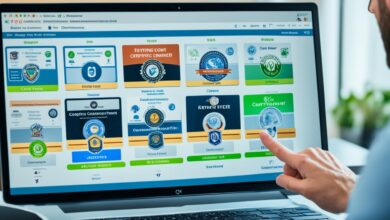Master Your Future with a Career Development Plan

Are you ready to take charge of your professional journey? Do you have a clear roadmap for achieving your career goals? Whether you’re just starting out or looking to level up, a well-crafted career development plan can be the key to unlocking your full potential and propelling you towards success.
But what exactly is a career development plan, and how can it help you achieve your aspirations? In this article, we will explore the essential components of a career development plan, from setting SMART goals to developing valuable skills and building a strong professional network. By the end, you’ll have the knowledge and tools to create a personalized career development plan that aligns with your ambitions, accelerates your growth, and opens doors to new opportunities.
Key Takeaways:
- A career development plan is a strategic roadmap that helps individuals navigate their professional journey and achieve their career goals.
- Setting SMART goals is crucial for effective career planning and development, as they provide clarity and focus.
- Continuous skill development and learning are essential for staying competitive in the ever-evolving job market.
- Building a strong professional network can open doors to new opportunities and provide valuable support and guidance.
- Personal development and self-reflection play a vital role in shaping a fulfilling and successful career path.
The Vital Role of Career Planning and Development
Career planning and development play a crucial role in shaping the success and satisfaction of an individual’s professional journey. By actively managing their career paths, individuals can navigate job transitions, seek out advancement opportunities, and pursue personal growth. It is through a strategic approach to career planning that individuals can shape their futures and achieve their goals.
Career planning is more than just finding a job; it involves a thoughtful and proactive approach to mapping out a professional trajectory. It requires individuals to assess their strengths, interests, and long-term aspirations, aligning them with the opportunities available in the job market.
By taking charge of their career development, individuals can position themselves for success and satisfaction. They can proactively seek out new challenges, acquire the necessary skills and competencies, and adapt to changes in their industries. Through strategic career planning, individuals gain a sense of purpose and direction in their professional lives.
Career planning sets the foundation for identifying and pursuing career paths that align with an individual’s interests and goals. It empowers professionals to make informed decisions about their professional development and take the necessary steps to secure their desired outcomes.
The Benefits of Career Planning and Development
Career planning provides individuals with a clear vision of their professional journey, setting them up for long-term success. It allows individuals to:
- Set achievable career goals that are aligned with their aspirations.
- Identify and prioritize skill development opportunities.
- Explore different career options and make informed decisions.
- Stay ahead of industry trends and changes in the job market.
- Establish a professional network to access new opportunities and support.
- Stay motivated and focused on their professional growth.
A well-thought-out career development plan enables individuals to seize opportunities, overcome challenges, and adapt to the evolving demands of the workplace. It provides a roadmap for their journey, helping them stay on track and make progress towards their goals.
“Career planning is not a one-time event; it is an ongoing process of self-reflection, skill-building, and adaptability.”
In the next section, we will delve deeper into the key components of effective career planning and explore ways in which individuals can proactively shape their career paths.
Understanding Career Planning
Career planning is a strategic process that involves deliberate decision-making to shape one’s professional trajectory. It goes beyond simply choosing a job, and encompasses assessing personal aspirations, considering long-term goals, and aligning them with opportunities in the job market.
By understanding the broader landscape of career possibilities and individual ambitions, career planning becomes a proactive endeavor aimed at achieving fulfillment and success.
When embarking on a career planning journey, it’s essential to reflect on personal aspirations. What are your passions? What type of work brings you joy and fulfillment? Identifying your intrinsic motivations and aligning them with your career choices will help guide you towards a path that resonates with your values.
Setting Long-Term Goals
Another crucial aspect of career planning is setting long-term goals. Long-term goals provide a roadmap for your professional development and give you something to strive towards over time.
When setting these goals, it’s important to consider the bigger picture. Where do you see yourself in five or ten years? What achievements would you like to accomplish? By defining your long-term goals, you can work backward and create shorter-term objectives that align with your overarching aspirations.
The Strategic Process
Career planning follows a strategic process that involves multiple stages. These stages may include self-assessment, career exploration, and action planning.
- Self-Assessment: This stage involves a thorough evaluation of your skills, strengths, values, and interests. Understanding your unique attributes will help you align them with potential career opportunities.
- Career Exploration: During this stage, you research different industries, job roles, and organizations to gain a comprehensive understanding of the options available to you. It’s essential to consider your personal aspirations and match them with career paths that align with your long-term goals.
- Action Planning: Once you have assessed yourself and explored various career options, it’s time to create an action plan. This plan should outline the steps you need to take to achieve your goals, including acquiring new skills or education, networking, and leveraging opportunities.
By following this strategic process, you can proactively shape your professional trajectory and take meaningful steps towards realizing your career aspirations.
In conclusion, career planning is a proactive and strategic endeavor that involves understanding personal aspirations and setting long-term goals. By following a deliberate process and aligning your ambitions with the opportunities available, you can create a fulfilling and successful career path for yourself.
Exploring Career Options
Effective career planning begins with thorough research into various industries and professions. By researching industries, individuals gain valuable insights into the diverse landscape of the job market. Understanding industry trends and demands can provide a solid foundation for making informed decisions about potential career paths.
One way to explore different sectors is by leveraging assessment tools and resources designed to help individuals identify their strengths, interests, and aptitudes. These tools can provide a comprehensive understanding of personal affinities and guide individuals towards career paths that align with their unique attributes.
“Researching industries and utilizing assessment tools can help individuals map out their professional trajectories and make informed decisions about their career paths.”
It’s essential to adopt a flexible mindset during the exploration phase of career planning. While it’s important to have a primary career path in mind, considering alternative trajectories can open up new possibilities and opportunities. By embracing a flexible mindset, individuals can proactively navigate their career journeys and adapt to changing market dynamics.
Leveraging Research and Assessment Tools
Researching industries involves gathering information about different sectors, such as their current state, growth potential, and the types of roles available. This can be done through online resources, industry publications, professional networks, and informational interviews. By immersing themselves in the knowledge of various industries, individuals can gain a comprehensive understanding of potential career options.
Furthermore, assessment tools such as career assessments, personality tests, and skills inventories can provide valuable insights into an individual’s strengths, interests, and aptitudes. These tools help individuals map their unique set of skills and attributes to specific roles or industries, enabling better alignment with their career goals and aspirations.
By combining industry research with self-assessment using assessment tools, individuals can make informed decisions about their career trajectories. This mapping of trajectories empowers individuals to take proactive steps towards their desired career paths and set achievable goals.
With the right research and assessment tools, individuals can explore various industries, gather relevant information, and gain a clear understanding of their potential career paths. By investing time and effort into this exploration phase, individuals can make informed decisions about their future, setting themselves up for a successful and fulfilling professional journey.
Setting SMART Goals
Setting clear and achievable career goals is crucial when developing an effective career plan. By establishing SMART goals, individuals can create a roadmap for success. SMART stands for Specific, Measurable, Achievable, Relevant, and Time-bound goals. Breaking down larger goals into smaller, manageable objectives allows for better tracking of progress and makes it easier to adjust strategies accordingly.
SMART goals are:
- Specific: Clearly define the desired outcome or objective.
- Measurable: Establish criteria to track progress and determine success.
- Achievable: Set goals that are realistic and attainable.
- Relevant: Ensure that the goals align with your long-term career aspirations.
- Time-bound: Set a timeline or deadline to create a sense of urgency and focus.
By incorporating these elements into goal-setting, individuals can enhance their career planning process and increase the likelihood of achieving their desired outcomes. For example, instead of setting a general goal like “Improve social media presence,” a SMART goal would be “Increase social media engagement by 20% within three months.” This specific objective allows for clear measurement and evaluation of progress.
Remember, setting SMART goals is an ongoing process. Regular evaluation and adjustment of goals ensures that they remain challenging, attainable, and relevant as circumstances change.
Developing Skills and Competencies
Identifying essential skills is a crucial step towards success in your chosen career path. To remain competitive in the job market, you must prioritize skill development and continuously invest in continuous learning. By acquiring and honing the skills that are highly valued in your industry, you will position yourself for greater opportunities and growth.
There are various strategies you can employ to enhance your skills and adapt to the ever-evolving job market dynamics. Consider the following:
- Formal Education: Pursue advanced degrees or certifications that align with your career goals. Higher education can provide you with in-depth knowledge and expertise in your field.
- On-the-job Training: Take advantage of training programs and professional development opportunities offered by your employer. This will allow you to gain new skills and broaden your competencies within your current role.
- Workshops and Seminars: Attend industry-specific workshops and seminars to learn from experts and stay up-to-date with the latest trends and innovations in your field.
- Self-directed Learning: Take the initiative to learn independently by leveraging online courses, tutorials, and educational resources available on various platforms.
“The capacity to learn is a gift; the ability to learn is a skill; the willingness to learn is a choice.” – Brian Herbert
By embracing a mindset of continuous learning, you demonstrate your commitment to personal and professional growth. Remember, honing your skills and acquiring new ones is an ongoing process that requires dedication and perseverance.
Continuous Learning for Career Growth
Continuous learning is not just about acquiring technical skills; it also involves the development of essential skills that are highly valued by employers across industries. These skills, also known as soft skills or transferable skills, are vital for success in the workplace.
Examples of essential skills include:
- Effective Communication
- Critical Thinking
- Problem-Solving
- Leadership
- Teamwork and Collaboration
- Adaptability and Flexibility
Developing these skills can significantly enhance your career prospects and make you a valuable asset to any organization. Moreover, these skills are transferable across different roles and industries, allowing you to explore diverse career paths.
Investing time and effort in continuous learning not only boosts your employability but also increases your confidence and job satisfaction. It is a lifelong process that empowers you to adapt to changing work environments and seize new opportunities.
Staying abreast of industry trends, new technologies, and emerging best practices is essential for continuous learning. Networking with professionals in your field, joining industry associations, and engaging in online communities can enrich your understanding and help you discover new avenues for skill development.
| Benefits of Skill Development and Continuous Learning | Strategies for Skill Development |
|---|---|
|
|
Remember, skill development and continuous learning are key elements in shaping a successful and fulfilling career. By embracing the journey of lifelong learning, you position yourself for growth, advancement, and a prosperous professional future.
Networking and Building Relationships
Building a strong professional network is essential for career advancement. Networking allows individuals to establish valuable connections with others who can provide support, guidance, and opportunities for growth. By fostering mutually beneficial relationships, individuals can expand their professional reach and enhance their professional reputation.
When it comes to networking, there are several essential strategies to consider:
- Identify Central Individuals: Seek out key individuals in your industry or field who have established themselves as leaders or experts. These individuals can serve as valuable mentors or allies in your professional journey.
- Seek Their Perspectives: Take the opportunity to engage in conversations and seek the perspectives of these central individuals. Their insights and experiences can provide valuable guidance and inspiration.
- Align Actions with Organizational Goals: Networking is not just about building connections; it also involves strategically aligning your actions with the goals of your organization or industry. This can help you create meaningful relationships that are mutually beneficial.
Effective networking can lead to a wide range of benefits, including job opportunities, access to industry insights, and collaborations on projects or initiatives. It allows individuals to tap into the power of their professional network to navigate challenges and seize new opportunities.
Importance of Professional Connections
“Your professional network is one of your most valuable assets. It’s not just about who you know but the relationships you build and maintain. These connections can be the key to unlocking new opportunities and achieving long-term success in your career.” – Jane Smith, CEO of XYZ Corporation
Professional connections play a pivotal role in career development. They provide access to information, resources, and support systems that can help individuals advance in their chosen fields. By cultivating and nurturing professional connections, individuals expand their sphere of influence and open doors to new possibilities.
While networking may seem intimidating for some, it is a skill that can be developed and honed over time. By being proactive, authentic, and genuine in your interactions, you can build lasting professional connections that bring value to both parties involved.
To summarize, networking is an essential component of career development and advancement. By building a strong professional network, individuals can tap into a wealth of resources, support, and opportunities. Take the time to nurture your connections, seek out guidance from central individuals, and align your actions with organizational goals. Networking is a powerful tool that can propel your career to new heights.
| Benefits of Networking | Tips for Successful Networking |
|---|---|
|
|
Leveraging Personal Development
Personal development plays a crucial role in both career planning and individual growth. By engaging in self-reflection and self-assessment, individuals can gain valuable insights about their skills, strengths, and interests. Self-reflection allows for a deeper understanding of personal goals and aspirations, enabling individuals to align their career paths with their true passions.
Self-awareness is a fundamental component of personal development. It involves recognizing one’s emotions, values, and beliefs, while also understanding how they impact personal and professional interactions. By developing self-awareness, individuals can make conscious choices that align with their values, leading to greater fulfillment and success in their career journeys.
In order to foster personal growth and career success, continuous learning is essential. This involves seeking out new knowledge and experiences, whether through formal education, workshops, conferences, or online courses. By actively expanding their skill set and knowledge base, individuals can stay ahead of industry trends and remain adaptable in a rapidly changing job market.
“Personal development is a lifelong journey of self-discovery and growth. It is the commitment to continuously improve oneself, not just professionally, but also in terms of personal well-being and overall happiness.”
A growth mindset is crucial for personal development. Embracing a growth mindset means believing in one’s ability to learn and adapt, even in the face of challenges. It encourages individuals to view setbacks as opportunities for growth and to embrace the process of continuous improvement.
Throughout the personal development journey, it’s important to seek experiences that contribute to professional growth and fulfillment. This may involve seeking out new challenges, taking on leadership roles, or volunteering for projects that push one’s boundaries. By stepping out of one’s comfort zone, individuals can cultivate new skills, broaden their perspectives, and unlock their true potential.
Benefits of Personal Development in Career Planning and Growth
Personal development offers numerous benefits for career planning and growth. Here are a few key advantages:
- Enhanced self-awareness: Personal development enables individuals to gain a deeper understanding of themselves, their values, and their motivations. This self-awareness allows for better alignment between personal aspirations and career goals.
- Increased confidence: Through personal development, individuals gain confidence in their abilities and strengths. This confidence translates into greater assertiveness and resilience when facing career challenges.
- Improved adaptability: Personal development fosters a growth mindset and a willingness to embrace change. This adaptability is crucial in navigating career transitions and staying relevant in a rapidly evolving job market.
- Expanded network: Engaging in personal development often involves networking with like-minded individuals. This expands one’s professional network, opening up new opportunities for mentorship, collaboration, and career advancement.
By leveraging personal development as a strategic tool, individuals can shape their career paths, achieve personal fulfillment, and unlock their full potential in the professional world.
Overcoming Challenges in Career Development
Career development often presents a variety of challenges and obstacles that individuals must overcome in order to progress along their chosen paths. From navigating career transitions to dealing with setbacks and adapting to the ever-changing dynamics of the job market, resilience is a key attribute that can make all the difference. By cultivating a mindset of adaptability and seeking support from mentors and career advisors, individuals can successfully navigate and conquer the challenges that they encounter on their career journeys.
In today’s fast-paced work environment, career transitions have become increasingly common. Whether it’s a shift from one industry to another or a move from a traditional employment setting to entrepreneurship, transitioning into a new career can be daunting. It requires resilience and the ability to embrace change while leveraging existing skills and experiences. By treating career transitions as opportunities for growth and personal development, individuals can navigate them more effectively, positioning themselves for success in their new roles.
“The resilience to overcome obstacles and adapt to change is an essential skill in today’s rapidly evolving job market.” – Career Development Expert
Moreover, setbacks are an inevitable part of any career journey. They may come in the form of rejections, failed projects, or temporary setbacks in achieving career goals. However, resilient individuals see setbacks as opportunities for growth and learning. They use these experiences to reflect on their strengths and weaknesses, adjust their strategies, and develop new skills. By bouncing back from setbacks and using them as springboards for future success, individuals can build a more robust and fulfilling career.
Adapting to the ever-changing dynamics of the job market is another challenge that individuals face in their career development. Industries evolve, technologies change, and new trends emerge. Resilient individuals recognize the importance of staying agile and continually updating their skills to remain competitive. They embrace lifelong learning and seek out opportunities to enhance their knowledge and expertise. By staying ahead of the curve, individuals can position themselves as valuable assets in a rapidly changing job market.
The Importance of Resilience in Overcoming Challenges
Resilience plays a crucial role in overcoming career development challenges. It empowers individuals to adapt, bounce back, and thrive in the face of adversity. Resilient individuals possess the ability to remain focused on their long-term goals while navigating the ups and downs of their career journeys. They possess a growth mindset, viewing challenges as opportunities for learning and personal growth rather than insurmountable barriers.
Developing resilience involves building a support network of mentors, career advisors, and like-minded professionals who can provide guidance and encouragement during difficult times. Seeking their perspectives and leveraging their experiences can help individuals gain new insights and find innovative solutions to challenges. Additionally, investing in personal well-being through practices such as mindfulness, self-care, and self-reflection can foster resilience and mental strength.
Building Resilience: Strategies for Success
Here are some strategies that individuals can implement to build resilience and overcome challenges in their career development:
- Stay adaptable and open to new opportunities and experiences.
- Take setbacks as learning opportunities and use them to grow and develop.
- Invest in continuous learning and skill development to stay competitive.
- Build a strong support network of mentors and career advisors for guidance and encouragement.
- Practice self-care and mindfulness to maintain mental well-being.
By incorporating these strategies into their career development journeys, individuals can enhance their resilience and overcome the obstacles that lie in their path. With resilience as their guiding force, individuals can move forward with confidence, navigating challenges and achieving success in their chosen careers.
| Challenges in Career Development | Strategies to Overcome Challenges |
|---|---|
| Career transitions | Stay adaptable and treat transitions as opportunities for growth. |
| Setbacks and failures | View setbacks as learning experiences and adjust strategies accordingly. |
| Adapting to changing job market dynamics | Invest in continuous learning and skill development to remain competitive. |
| Building resilience | Build a support network, practice self-care, and embrace a growth mindset. |
Creating a Career Development Plan
Now that you have gained insights from the previous sections, it’s time to put it all together and create your own career development plan. This plan will serve as a roadmap to guide your professional journey, ensuring continuous growth and achievement.
To begin, start by setting specific goals that align with your career aspirations. These goals should be actionable and achievable, allowing you to take meaningful steps towards your desired outcomes. Whether it’s acquiring new skills, seeking a promotion, or transitioning to a different industry, clarity in your goals will provide a clear direction for your career development plan.
Once you have defined your goals, it’s essential to identify the actionable strategies and action steps needed to achieve them. Consider what resources, opportunities, and support you will require to reach your objectives. Break down the strategies into actionable steps that can be easily implemented and tracked.
Effective progress tracking is crucial for staying on track with your career development plan. Regularly assess your progress and make adjustments as necessary. This could involve evaluating your skill development, tracking milestones, or reviewing the effectiveness of your strategies. Progress tracking will help you stay accountable and make informed decisions as you move forward.
As you navigate your career development journey, milestones serve as important markers of success. Whether it’s completing a certification program, securing a new job, or reaching a specific level of expertise, milestones provide a sense of accomplishment and motivation. Celebrate these milestones along the way and use them as stepping stones towards your ultimate career goals.
Remember, a career development plan is not set in stone. It will evolve and adapt as you grow and your goals change. Embrace flexibility and be open to adjusting your strategies and milestones as needed.
In the next section, we will conclude our exploration of career planning and development, summarizing the key takeaways and emphasizing the importance of ongoing professional growth and advancement. Stay tuned!
Conclusion
By following the principles and strategies outlined in this article, individuals can create a career development plan that unlocks their full potential. Career planning and development are ongoing processes that require continuous learning, adaptability, and resilience. With a strategic approach and the right tools, individuals can navigate their professional journeys with purpose and achieve long-term success.
A well-crafted career development plan is instrumental in fostering professional growth and career advancement. It provides a clear roadmap to success by setting achievable goals, identifying necessary skills, and creating actionable strategies. By diligently following the plan, individuals can make meaningful progress towards their career objectives.
Success in one’s professional journey depends on thoughtful career development and a commitment to personal growth. It requires individuals to stay updated with industry trends, continuously develop their skills, and leverage networking opportunities. A proactive approach to career planning empowers individuals to seize new challenges and unlock diverse opportunities.
Remember, a career development plan is a living document that evolves with time and experience. Review and update it regularly to align with changing goals and ambitions. By consistently investing in personal and professional development, individuals can shape their own success story and make a lasting impact in their chosen fields.







